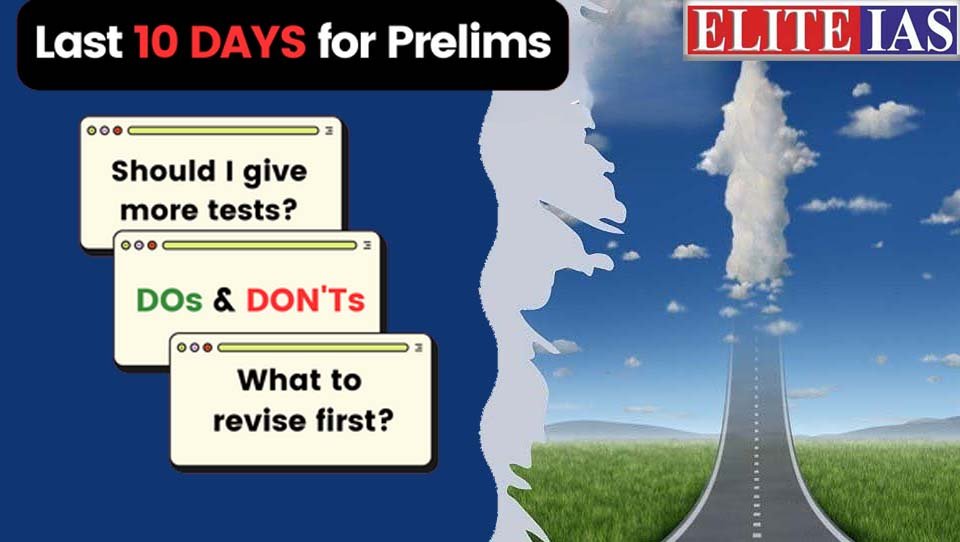
The last 10 days before any examination can be both a period of intense pressure and a valuable opportunity for strategic preparation. When it comes to the Preliminary stage of any competitive exam, such as the civil services examination, these final days hold particular significance. Aspirants who have been diligently preparing for months often find themselves at a critical juncture where every moment counts. In these last days, it becomes important to strike the right balance between revision, practice, and mental well-being. Here’s a comprehensive guide on what to do in the last 10 days of prelims to maximize your chances of success. This is based on Elite IAS coaching centre in Delhi classroom course instructions.
1. Consolidate Notes:
Consolidating existing notes is another critical aspect of UPSC Prelims preparation. Revisiting and organizing notes ensure that candidates have a comprehensive resource that covers all essential concepts, facts, and figures outlined in the syllabus.
By consolidating notes, candidates can streamline their study materials, making them more accessible and conducive to effective revision. Organizing notes in a structured manner facilitates easier review and comprehension, enabling candidates to quickly locate information when revising.
Additionally, condensing lengthy notes into concise summaries enhances efficiency, allowing candidates to grasp key points more readily during revision sessions. Overall, consolidating notes not only reinforces learning but also optimizes study resources, thereby enhancing the effectiveness of UPSC Prelims preparation efforts.
2. Previous Year Papers:
One essential aspect of effective exam preparation is the regular practice of solving questions from previous years’ papers. By dedicating specific time slots to tackle these questions, you not only engage in targeted revision but also simulate the exam environment by adhering to timed conditions.
This practice allows you to assess your proficiency level and familiarize yourself with the types of questions likely to appear on the exam. Moreover, through careful analysis of your performance, you can pinpoint areas of weakness or recurring mistakes. By identifying these gaps in your understanding, you can redirect your revision efforts towards strengthening your grasp of these topics.
In doing so, you enhance your overall preparedness and increase your chances of performing well on the exam. Thus, integrating previous year papers into your study routine serves as a strategic approach to comprehensive exam preparation. You can get previous years prelims questions papers in the Apps of Elite IAS – one of the best online coaching for UPSC.
3. Stick to Your Sources:
As you progress in your preparation journey, it’s crucial to maintain consistency and stick to the sources that have served you well thus far. Introducing entirely new study materials at this stage can be counterproductive, potentially leading to confusion and distraction. It’s advisable to rely on trustworthy sources such as standard textbooks, reference books, and online resources that you are already familiar with.
These materials have likely provided you with a solid foundation and understanding of the subject matter. Deviating from them now might disrupt your learning process and hinder your progress. By staying focused on your existing resources, you can maintain clarity and build upon the knowledge you’ve already acquired, ultimately maximizing your chances of success.
4. Review the Syllabus:
Reviewing the UPSC Prelims syllabus is the foundational step in preparing effectively for the exam. By thoroughly examining the entire syllabus, candidates can gain a comprehensive understanding of the breadth and depth of topics they need to cover. This process involves not only identifying the subjects and themes but also discerning the relative weightage assigned to each topic. By recognizing the areas of the syllabus that carry more significance, candidates can prioritize their revision efforts accordingly.
Furthermore, understanding one’s own strengths and weaknesses in relation to the syllabus is essential for strategic preparation. Identifying the topics that align with one’s strengths allows candidates to allocate sufficient time for revision while also recognizing areas that may require more attention and focus.
You Can Read Also: How To Calculate Score in UPSC Prelims After Negative Marking
5. Mock Tests:
In the final stretch of UPSC Prelims preparation, if you haven’t already undertaken an adequate number of online test series for UPSC, it’s highly advisable to incorporate 1-2 full-length mock tests into your regimen. These simulated exams not only provide a glimpse into the actual test environment but also offer a crucial opportunity to assess your readiness.
Post-mock analysis becomes paramount, as it allows you to meticulously scrutinize your performance, identifying specific areas of weakness or difficulty. Whether it’s conceptual understanding, time management, or exam strategy, pinpointing these shortcomings is instrumental in refining your preparation strategy. With insights gleaned from this analysis, you can then tailor your revision efforts, allocating focused attention to the identified weak spots.
By addressing these areas through targeted revision, you bolster your confidence and competency, thereby significantly enhancing your preparedness for the UPSC Prelims examination.
6. CSAT Practice:
It’s crucial not to overlook the CSAT (Civil Services Aptitude Test) section while preparing for the UPSC exam. Dedicate some time to practicing CSAT questions to enhance your speed and accuracy in solving them. Often, candidates focus more on the General Studies portion and may neglect the CSAT section, which can impact their overall performance.
However, the CSAT section plays a significant role in determining your success in the exam. By practicing CSAT questions regularly, you can sharpen your analytical and reasoning abilities, as well as improve your proficiency in quantitative aptitude and comprehension. Additionally, practicing CSAT questions helps you become familiar with the exam format and timing constraints, ensuring you’re well-prepared to tackle this section effectively on exam day.
Therefore, allocate sufficient time in your study schedule to practice CSAT questions and refine your skills, ultimately boosting your chances of success in the UPSC exam.
7. Manage Anxiety:
As you approach the final days of preparation, it’s natural for stress and anxiety to escalate. However, it’s essential to manage these feelings effectively to maintain focus and clarity. Implementing relaxation techniques, such as meditation or deep breathing exercises, can be immensely beneficial in alleviating anxiety and promoting a sense of calmness.
By incorporating these practices into your daily routine, you can cultivate a more resilient mindset and better cope with the pressures of the upcoming task. Engaging in moments of mindfulness can also help center your thoughts and ground you in the present moment, reducing feelings of overwhelm or panic. Prioritizing self-care and mental well-being during this crucial period can significantly enhance your ability to perform at your best when it matters most.
8. Healthy Habits:
Maintaining healthy habits is paramount as you approach your upcoming endeavours. Prioritize adequate sleep, nourishing meals, and regular exercise to support both your physical and mental well-being.
Sufficient sleep ensures your mind is rested and ready for the challenges ahead, while nutritious food provides the energy and nutrients necessary for peak performance. Regular exercise not only enhances physical fitness but also releases endorphins that boost mood and reduce stress.
By prioritizing these aspects of self-care, you not only optimize your ability to focus and retain information but also cultivate resilience and stamina to tackle challenges effectively. Remember, your overall well-being is the foundation upon which success is built, making it imperative to prioritize your health as you strive for excellence.
You Can Read Also: Complete Strategy to Revise UPSC Civil Services Prelims Exam Syllabus In Two Months
9. Quick Revisions:
As you enter the final stretch of your preparation, it’s crucial to prioritize quick revisions to consolidate your knowledge and reinforce key concepts. Allocate the last five days for rapid review sessions, aiming to cover two subjects each day alongside dedicated practice for the CSAT section.
This focused approach allows you to efficiently refresh your understanding of the material, targeting areas that may require additional attention while ensuring comprehensive coverage of the syllabus. By dividing your time effectively between subjects and incorporating CSAT practice, you not only solidify your grasp on core topics but also hone your skills in analytical reasoning and problem-solving.
Additionally, maintaining a structured study schedule during this critical period helps manage time effectively and minimizes the risk of feeling overwhelmed. Through strategic planning and diligent revision, you can maximize your preparedness and approach the upcoming assessments with confidence and competence.
10. Stay Positive:
As you approach the final moments before your exam, it’s crucial to maintain a positive mindset and avoid succumbing to last-minute doubts. Trust in the hard work and dedication you’ve invested throughout your preparation journey. Rather than dwelling on uncertainties, focus on the knowledge and skills you’ve acquired, believing in your ability to perform well. Cultivating a positive attitude not only boosts your confidence but also enhances your cognitive function, allowing you to approach the exam with clarity and composure.
Remember that a positive outlook can significantly impact your performance, enabling you to tackle challenges with resilience and determination. Embrace the opportunity to showcase your capabilities and demonstrate your readiness for success. By staying positive and optimistic, you can navigate the exam confidently and maximize your potential for achieving your desired outcomes.
Thus, in the countdown to the Preliminary examination, the final stretch of the last 10 days holds immense significance. It is during this time that the consolidation of your preparation and the fine-tuning of your exam strategy become paramount. By adhering to a set of crucial tips and maintaining a high level of focus, discipline, and resilience, you can maximize the effectiveness of this critical period and enhance your prospects of success in the exam. It’s imperative to remain composed, confident, and resolute, as these qualities will fortify your efforts during this challenging phase. Keeping a cool head amidst the pressure and staying unwaveringly determined will undoubtedly yield dividends, as your diligent efforts and unwavering dedication will ultimately bear fruit.




